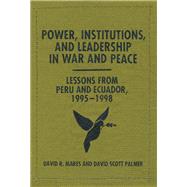- ISBN: 9780292735699 | 0292735693
- Cover: Hardcover
- Copyright: 6/15/2012
In January 1995, fighting broke out between Ecuadorian and Peruvian military forces in a remote section of the Amazon. It took three years for peace negotiations to end the war after hundreds lost their lives. Ecuador refused to abandon outposts that had been constructed during the territory dispute, though the border dispute had truly begun years before, making it the oldest sustained boundary conflict in the Western Hemisphere. The incident reflected other territorial and maritime boundary disputes that have persisted in the region. Drawing on extensive field research at the time of the dispute and during its aftermath, including interviews with high-ranking diplomats and military officials, Power, Institutions, and Leadership in War and Peaceis the first book-length study to relate this complex border dispute and its resolution to broader theories of conflict. The findings emphasize an emerging leadership approach in which individuals are not mere captives of power and institutions. In addition, the authors illuminate an overlap in national and international arenas in shaping effective articulation, perception, and selection of policy. In the "new" democratic Latin America that emerged in the late 1970s through the early 1990s, historical memory remains influential in shaping the context of disputes, in spite of presumed U.S. post-Cold War influence. This study offers important, broader perspectives on a hemisphere still rife with boundary disputes as a rising number of people and products (including arms) pass through these borderlands.






